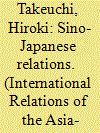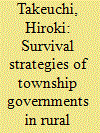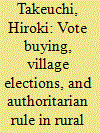| Srl | Item |
| 1 |
ID:
167509


|
|
|
|
|
| Summary/Abstract |
Xi Jinping has concentrated his power since he acceded to the Chinese presidency. Where will Xi bring China? In this review essay I discuss four single-authored books – one in English and three in Japanese – to explore security implications of Xi’s reform and foreign policies. In her recent book, Elizabeth Economy is critical of Xi, arguing that he is turning away from Deng Xiaoping’s reform and internationalist policies. The three Japanese China specialists concur, and further highlight the interconnectedness of domestic politics and international relations. In sum, the four books show that Xi has struggled to commit to the state-owned enterprise reform and to cooperative foreign policy due to Chinese domestic politics, and as a result, has threatened regional security in the Asia-Pacific.
|
|
|
|
|
|
|
|
|
|
|
|
|
|
|
|
| 2 |
ID:
118946


|
|
|
|
|
| Publication |
2013.
|
| Summary/Abstract |
More than three decades have passed since Deng Xiaoping opened China to the outside world with a series of sweeping economic reforms. Yet, before China entered the World Trade Organization (WTO) in 2001, even at the height of free trade in the 1990s while lowering trade barriers overall, the Chinese government continued to protect some industries. This article explores the cross-industrial variation in trade protectionism in the 1990s, when the Chinese government was negotiating for accession to the WTO. It demonstrates that the major incentive of the Chinese government for trade protectionism was political, involving such factors as the state sector's inefficiency, the ease with which workers could organize to rebel, and bureaucratic organizations' pressure on the government on behalf of certain industries. The Chinese government chose to protect certain industries to prevent free trade from exacerbating social instability in the 1990s.
|
|
|
|
|
|
|
|
|
|
|
|
|
|
|
|
| 3 |
ID:
131385


|
|
|
|
|
| Publication |
2014.
|
| Summary/Abstract |
China and Japan have been deepening economic interdependence over the last two decades, while China has recently shown territorial ambitions and initiated disputes with Japan. This runs contrary to the commercial liberal literature that argues that trade promotes peace. On the other hand, the realist theory also does not fully explain Sino-Japanese relations because Sino-Japanese relations are not always in conflict. The rise of China and the relative decline of Japan might explain increasing tensions in the rivalry relationship, but what drives Chinese leaders to initiate disputes? I address the importance of domestic politics to examine Sino-Japanese disputes. I argue that the recent deterioration of the bilateral relationship could be explained by the power struggle in the Chinese leadership. To support the logic of this argument, I use a game-theoretic model, which accounts for how the type of Chinese leadership influences foreign policy outcomes in Sino-Japanese relations.
|
|
|
|
|
|
|
|
|
|
|
|
|
|
|
|
| 4 |
ID:
123361


|
|
|
|
|
| Publication |
2013.
|
| Summary/Abstract |
Based on my fieldwork in rural China in 2004-2005, where I conducted semi-structured interviews with 108 local cadres and villagers, this article explores the survival strategies of township governments as the most recent tax reforms (i.e. the tax-for-fee reform and the abolition of the agricultural tax) have been implemented since 2000. It argues that township governments have taken adaptive strategies to maintain over-quota personnel even under pressure to reduce it. It finds that the strategies have changed from predatory taxation in the 1990s to land trade in the last decade, while the implementation of the rural tax reforms has brought fiscal crises in agricultural villages. Local officials have a limited incentive to respond to collective resistance on taxation but do not have the same incentive on land disputes.
|
|
|
|
|
|
|
|
|
|
|
|
|
|
|
|
| 5 |
ID:
120589


|
|
|
|
|
| Publication |
2013.
|
| Summary/Abstract |
Village elections are a democratic institution in one of the most resilient authoritarian regimes in the world. The Chinese Communist Party (CCP) has promoted village elections over the past twenty years, but not elections at higher levels. I present a game-theoretic model in which candidates would engage in vote buying when competing in a small electorate but not when competing in a larger electorate. The model's equilibrium outcome implies that the logic of China's introduction of village elections inherently limits this democratic reform to the grassroots level. Elections for higher levels of government would be dangerous to the regime because they would lead candidates to create substantive policy platforms and political organizations. Thus, rather than being an experiment that has failed to lead to further reforms, village democracy is self-limiting by design.
|
|
|
|
|
|
|
|
|
|
|
|
|
|
|
|